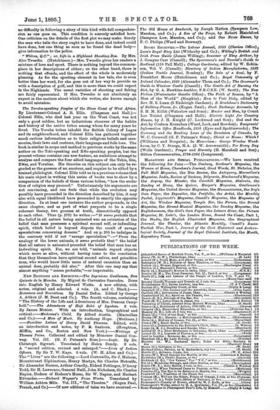Colonel Ellis, who died last year on the West Coast,
was not only a good soldier, but an industrious observer of the habits and history of the native tribes among whom for many years he lived. The Yoruba tribes inhabit the British Colony of Lagos and its neighbourhood, and Colonel Ellis has gathered together much curious information as to their religious beliefs and cere- monies, their laws and customs, their language and folk-lore. The book is similar in scope and method to previous works by the same author on the Tshi-speaking and E we-speaking peoples, but the present volume contains one new feature, an ambitious attempt to analyse and compare the four allied languages of the Tshis, Giis, E Wes, and Yorubas. His theories on this subject can only be re- garded as the guesses of an amateur, and require to be sifted by a trained philologist. Colonel Ellis told us in a previous volume that his main object in writing this series of books was to show by a comparison of the beliefs of these various tribes, " how the evolu- tion of religion may proceed." Unfortunately his arguments are not convincing, and one feels that while the evolution may possibly have proceeded in the direction described by him, it may also with equal likelihood have proceeded in exactly the opposite direction. In at least one instance the author propounds, in the same chapter, and as part of what purports to be a single coherent theory, two guesses at truth, diametrically opposed to each other. Thus (p. 276) he writes :—"It seems probable that the belief in all nature being animated was an extension of the belief that man possesses a spiritual second self, or indwelling spirit, which belief is beyond dispute the result of savage speculations concerning dreams." And on p. 283 he indulges in the contrary wild if not "savage speculation " :—" From the analogy of the lower animals, it seems probable that" the belief that all nature is animated preceded the belief that man has an indwelling spirit. For, we are told, "animals regard objects which move as alive, without having come to the conclusion that they themselves have spiritual second selves, and primitive man, who would know little more of natural causation than an animal does, probably did also." After this one may say that almost anything " seems probable,"—or improbable.






































 Previous page
Previous page